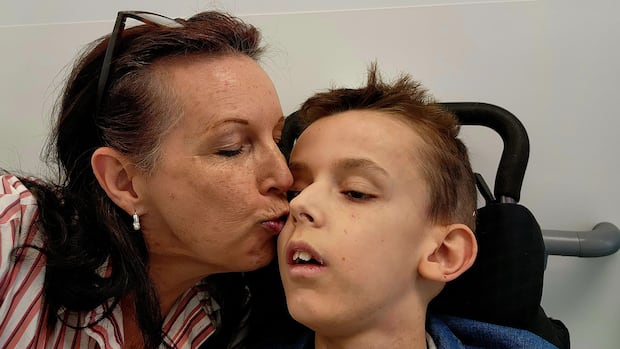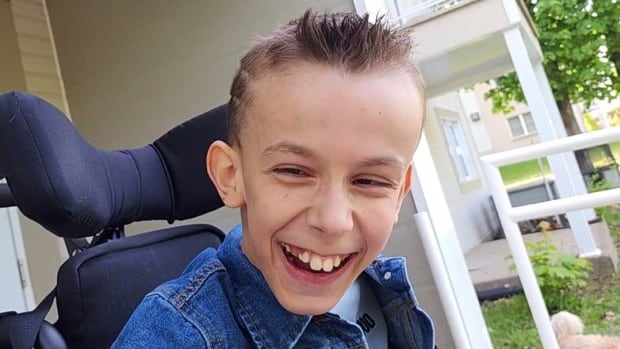
WARNING: This story contains images and details of a child near the end of his life.
Valérie Daigle wishes her son’s life could have ended differently — dignified and pain-free.
Instead, she says 11-year-old Grégory Tanguay was cooped up in a palliative care room in the Fleurimont Hospital in Sherbrooke, Que., conscious and whimpering as he suffered for weeks from malnourishment, seizures, and infection.
From birth, Grégory— whom she affectionately called “Greggy” — was diagnosed with neurological disabilities including cerebral palsy. He was non-verbal and could neither walk nor eat on his own.
Daigle says she’ll never be able to erase haunting memories of doctors being unable to ease her son’s pain.
“Seven weeks of suffering for a child: I find this abominable. If he had suffered like that in my home, I would be speaking to you from behind bars,” said Daigle, who lives in Shawinigan, Que, in the province’s Mauricie region.
“My little guy, [all] I could do was stroke him, reassure him the best I could but he was in pain.”
Daigle says MAID could have allowed her son to die with dignity.
She is now calling for better end-of-life care options for children — including the extension of medical assistance in dying (MAID) for some who are terminally ill.
“I don’t want a child to die because he’s disabled,” clarified Daigle. “However, there comes a time when the limit is reached and these children no longer have any quality of life and suffer a great deal.”
Since 2016, Canadian adults can qualify for MAID if they have a grievous and irremediable medical condition and are able to provide informed consent. In 2022, MAID accounted for about four per cent of deaths in Canada, according to the government.
As more people apply for assisted death, especially in Quebec, the conversation around who should be eligible continues to grow. But some experts and advocates say Canada may not be ready to extend the program to children due to major ethical and moral concerns.
Grégory’s case is even more specific.
Given his health, it was impossible for him to consent to assisted death. But his mother insists it would’ve been the humane way to end his life.
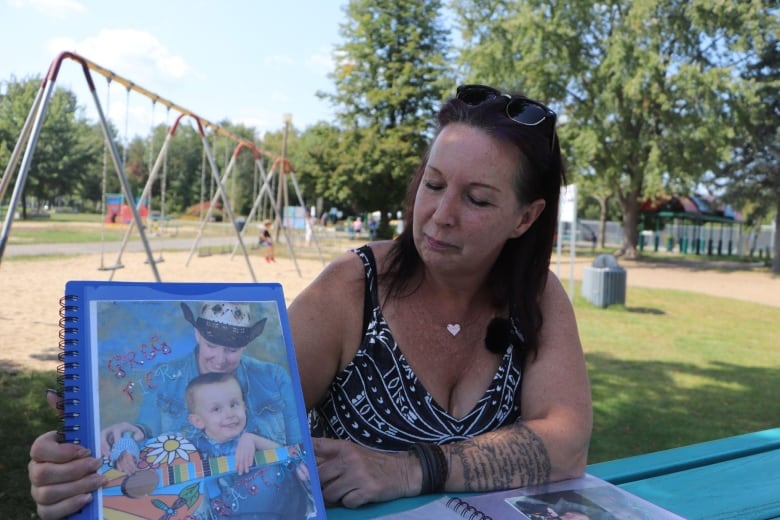
‘Pass the laws, do something. Just make my child comfortable’
“I can still hear him laugh. He had so much fun here,” said Daigle, walking in a park in the nearby city of Trois-Rivières, where she used to bring her son to play in the splash pad.
“You could say he was a perfect kid.”
Despite his conditions, what made him perfect in his mother’s eyes was the fact he was always full of joy.
In June, though, Grégory’s condition deteriorated quickly. During a surgery to fix a shunt — which is a small tube that helps drain excess cerebrospinal fluid from the brain — he caught a bacterial infection that led to abscess and an infection in his stomach.
Doctors didn’t have high hopes for Grégory. Further treatment would have meant another major surgery for the 11-year-old. His mother opted to move him into palliative care for what she envisaged as a comfortable death.
“It was far from comfortable for my little guy. It was atrocious. It wasn’t that the staff wasn’t doing their job, the staff was doing their best,” said Daigle.
Valérie Daigle is advocating for some children in Canada to be eligible for medical assistance in dying after watching her son Grégory suffer for weeks in palliative care. Experts say there are major obstacles to overcome before that could become a reality.
She says her son’s inability to be comforted and nourished and the lack of access to assisted death made the end of his life unbearable — for him and his family.
She says she watched him wither away to skin and bone before he finally passed on Aug. 17.
“Pass the laws, do something. Just make my child comfortable. He’s dying, can’t you have some respect for him?” said Daigle.
Is Canada ready for MAID expansion?
Georges L’Espérance, who wasn’t aware of Grégory’s case prior to his death, says in his experience it’s uncommon for a child to be kept in a state where they are not given hydration or feeding for an extended period of time.
“That child shouldn’t have agonized like that for so long,” said L’Espérance, a retired neurosurgeon and president of Quebec’s association for the right to die with dignity.
Although he says having a child suffer for weeks on end is “absolutely unacceptable,” he doesn’t think Canadians would be ready for the extension of MAID to children. He says there are other effective ways of alleviating suffering such as palliative care and proper medication.
The Netherlands and Belgium are the only two countries that allow assisted death for minors.
In the Netherlands, children as young as 12 can take charge of their treatment plan to request medical assistance in dying with their parents’ consent. Minors aged 16 and 17 can request such assistance as long as their parents have been consulted.
Dying with Dignity Canada has said that with the appropriate safeguards in place, “mature minors” — those presumed competent enough to consent — should be allowed the right to choose MAID or refuse lifesaving treatment.
In 2023, a Canadian parliamentary committee was tasked with studying MAID for minors and recommended including minors in the program who were deemed to have the decision-making capacity and whose death was reasonably foreseeable.
‘Who are we to judge?’
MAID revolves around consent and self-determination, meaning each individual has the first and last say, says Steven Laperrière the general manager of the Regroupement des activistes pour l’inclusion au Québec (RAPLIQ), which supports people with disabilities.
“Obviously in [Grégory’s] case, it was not something that was possible. And that raises a couple of questions on our side,” he said.
“Is it a good idea to allow medical aid in dying for children that are minor, that are in pain and all that? … Is it a good idea to allow it for other people that have mental health issues that are not able to decide for themselves? Where is the line?”
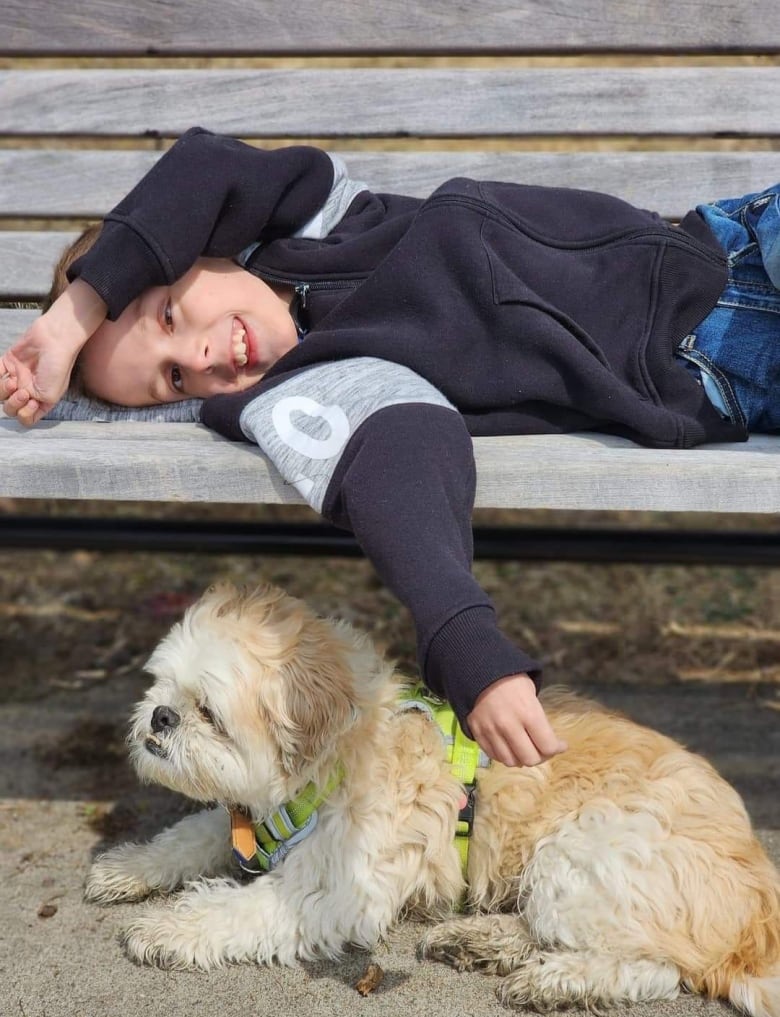
He says MAID cases involving children would have to be evaluated on a case-by-case basis — and that’s if Canadian laws ever reach that point.
“It’s heavy, it’s a touchy question and I know that if one of my children would be in a situation where all that’s awaiting him is pain, I mean, would I consider it? I don’t know. I’m not in that situation,” said Laperrière.
“Who are we to judge?”
According to the government of Canada, between 2016 and 2022 Quebec counted 14,578 deaths through MAID — the highest of any province.
The annual report also demonstrated that all jurisdictions, except Manitoba and Yukon, saw increases in MAID in 2022. The highest increase in percentages that year compared to the previous one occurred in Quebec.
“That tells me that something is wrong with our system,” said Laperrière.
He believes the spirit of the law is commendable, but as talk of its expansion increases, he adds: “It’s getting scary.”
Is MAID a ‘form of social abandonment?’
MAID was initially supposed to be an exceptional “act of last resort,” says Dr. Ramona Coelho, a family physician in London, Ont.
She says Canada ought to pause the expansion of MAID.
“We don’t allow children to smoke or drink alcohol because we’re trying to protect their future,” said Coelho.
“Yet we’re talking about a policy that would allow children to consent to death.”
She says there is not sufficient understanding of the implications on vulnerable children — those who might be in an abusive home or experience bullying, for example.
Reflecting on Grégory’s case, Catherine Frazee, a professor emeritus in disability studies at Toronto Metropolitan University, wrote in a statement to CBC that it’s important to ask why this boy’s distress — and his mother’s — was not more humanely tended to.
“If there were failures, as his mother suggests, then his doctors, his hospital and the province must be called to account. MAID is not the solution to system failures,” wrote Frazee.
“Despite the frequency with which MAID is rhetorically linked to dignity, they are not synonymous. As a substitute for quality end-of-life care, MAID can be and often is a form of social abandonment.”
The regional health authority in Sherbrooke says it cannot comment on this specific case.
In an emailed response, the office of Sonia Bélanger, Quebec’s minister responsible for seniors and health, said there is no consensus to expand MAID to include children, but the province is aware of the “sad reality” of some children, their parents and families.
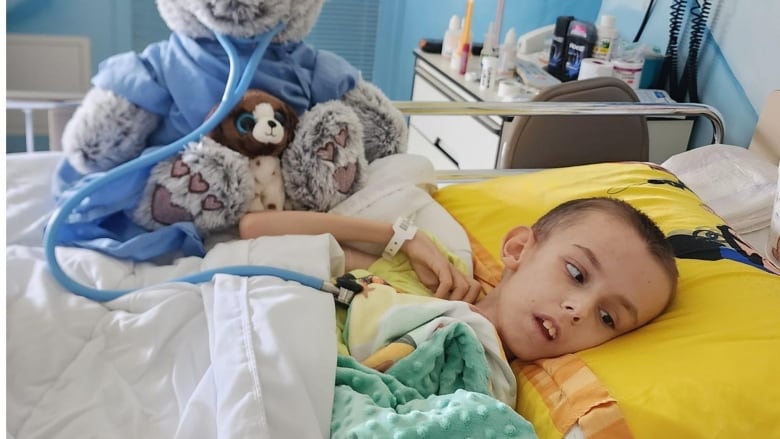
A ‘very complicated topic’
Dr. Eugene Bereza, a physician and ethics consultant in Montreal, says extending MAID to some minors has been a discussion long before Grégory’s case.
Bereza, who is also a former member of the commission on end-of-life care in Quebec — which reviews all the cases of MAID to ensure compliance with legal regulations —suspects it might be a while before Canada is ready because “it’s a very complicated topic.”
While change might not be imminent, he says the introduction of MAID is an example of how public opinion has changed quickly.
“That’s a huge shift socially in terms of what was ethically acceptable,” said Bereza.
“A little over a decade ago, this would have been a criminal offence. It would have been considered murder.”
In Quebec, he says the number of MAID deaths represent between seven to nine per cent of all deaths in the province. Ethically, he says it’s crucial to ensure MAID would not be pursued for “ulterior motives” or chosen when palliative care is also a good option.
In his career, he said he has rarely come across cases where there are challenges to palliate children and for whom medical aid in dying might be a consideration.
“Most parents love their kids and most parents want to do what’s best for their child and most parents have great difficulty watching their child suffer. So it’s completely understandable that the request might come,” said Bereza.
“But then we really would have had to have additional mechanisms of protecting that vulnerability.”
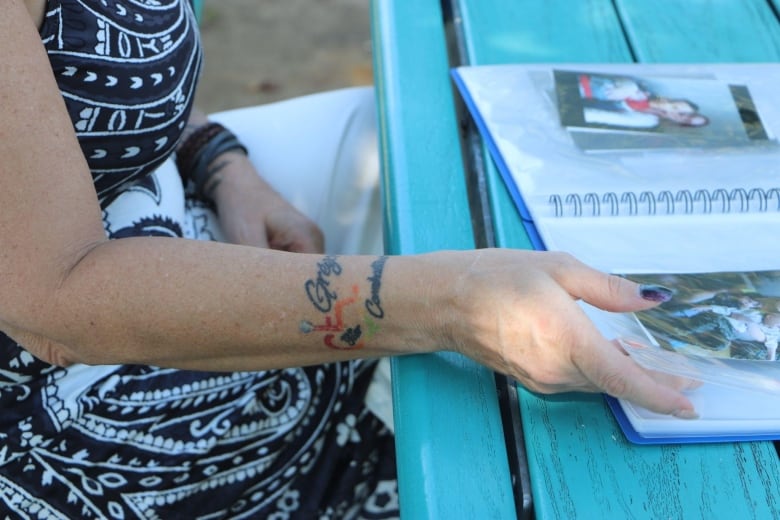
‘No parent wants to see their kid die like that’
Flipping through memory books from Grégory’s childhood, Daigle says all she wanted was to give her son the very best.
“It is important to talk about because I find that my child has the same rights as older people who are willing to say ‘I want to die, my life is too difficult,'” said Daigle.
“Why is it that for the entirety of their lives we [parents] have the right to say our opinion and manage their care but once we’re near death we have no rights?
“It makes no sense.”
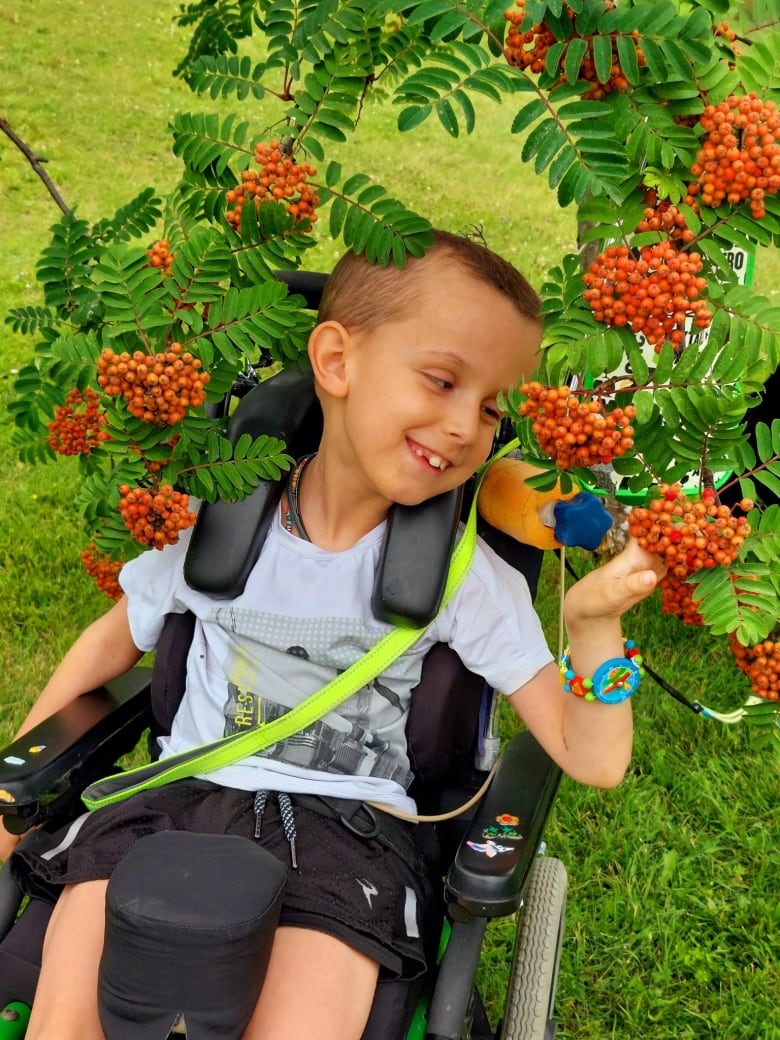
She chooses to remember her son as a sociable and smiley child, even if that was far from the case during his agonizing stint in palliative care.
The boy who — despite his unforgiving conditions — seemingly took everything in stride, spent the last weeks of his life cornered, with his mother by his side but overcome with a sense of powerlessness and guilt.
“I saw my child suffer more than ever,” Daigle said.
“No parent wants to see their kid die like that.”
